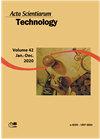Effects of solvent extraction on phenolic concentration and antioxidant capacity of the Oedogonium sp. (Chlorophyta) using a simplex-centroid mixture design
IF 0.6
4区 综合性期刊
Q3 MULTIDISCIPLINARY SCIENCES
引用次数: 0
Abstract
Among the freshwater benthic macroalgae found in Brazilian rivers and streams, species of Oedogonium (Chlorophyta) have shown great ability to produce high biomass in several environmental conditions. Their resilience to eutrophic habitats provides an opportunity to assess the use of Oedogonium biomass for applications in different fields, especially those related to the extraction of biologically active compounds of interest for health, food, and cosmetic applications. Thus, this study assessed the effects of different organic solvents (acetone, ethanol, and methanol) and their mixtures when combined with water (20% v/v), on the extraction efficiency of total phenolic compounds (TPC), and their antioxidant capacity (AC), from Oedogonium sp. biomass, using simplex-centroid mixture design. TPC ranged from 90 to 150 mg of gallic acid equivalent per 100 g dry weight (DW), while AC ranged from 1 to 8 µM of Trolox equivalent per gram (DW). The highest TPC and AC were found for extracts using an ethanol/acetone (50:50) binary aqueous solvent mixture, while the lowest values for both TPC and AC were found for the methanolic aqueous solvent. Considering the relatively low-cost and less adverse environmental impacts of the ethanol and acetone aqueous mixture, our results suggest that the use of this specific mixture of organic solvents may have significant advantages in an eventual industrial process for the extraction of phenolic compounds from Oedogonium species.溶剂萃取对叶绿藻酚类物质浓度和抗氧化能力的影响
在巴西河流和溪流中发现的淡水底栖大型藻类中,Oedogonium(绿藻)物种在几种环境条件下显示出产生高生物量的巨大能力。它们对富营养化栖息地的适应能力为评估欧度草生物量在不同领域的应用提供了机会,特别是那些与提取健康、食品和化妆品中感兴趣的生物活性化合物有关的领域。因此,本研究采用单纯质心混合设计,考察了不同有机溶剂(丙酮、乙醇和甲醇)及其与水(20% v/v)的混合溶剂对蛇根草生物质中总酚类化合物(TPC)的提取效率及其抗氧化能力(AC)的影响。TPC为每100 g干重(DW) 90 ~ 150 mg没食子酸当量,AC为每克(DW) 1 ~ 8µM Trolox当量。乙醇/丙酮(50:50)二元溶剂提取物的TPC和AC值最高,甲醇溶剂提取物的TPC和AC值最低。考虑到乙醇和丙酮水溶液混合物的相对低成本和较少的不利环境影响,我们的研究结果表明,使用这种特定的有机溶剂混合物可能在最终的工业过程中从石斛中提取酚类化合物具有显着的优势。
本文章由计算机程序翻译,如有差异,请以英文原文为准。
求助全文
约1分钟内获得全文
求助全文
来源期刊

Acta Scientiarum-technology
综合性期刊-综合性期刊
CiteScore
1.40
自引率
12.50%
发文量
60
审稿时长
6-12 weeks
期刊介绍:
The journal publishes original articles in all areas of Technology, including: Engineerings, Physics, Chemistry, Mathematics, Statistics, Geosciences and Computation Sciences.
To establish the public inscription of knowledge and its preservation; To publish results of research comprising ideas and new scientific suggestions; To publicize worldwide information and knowledge produced by the scientific community; To speech the process of scientific communication in Technology.
 求助内容:
求助内容: 应助结果提醒方式:
应助结果提醒方式:


